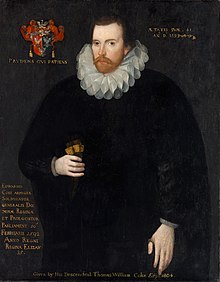Happy birthday, Sir Edward Coke!
 Today is the birthday of the greatest lawyer who ever lived, Sir Edward Coke. Lord Coke, who served as Queen Elizabeth I’s attorney general, was one of the founding fathers of the common law itself—one of the people who helped form the idea that courts should collect and review previous decisions to build up a body of precedent on which to rely. He helped articulate the basic principles of English liberty, explaining how the Magna Carta’s “law of the land” clause prohibited government from treating subjects arbitrarily. It was Lord Coke who devised such famous phrases as “a man’s home is his castle,” and “reason is the life of the law.”
Today is the birthday of the greatest lawyer who ever lived, Sir Edward Coke. Lord Coke, who served as Queen Elizabeth I’s attorney general, was one of the founding fathers of the common law itself—one of the people who helped form the idea that courts should collect and review previous decisions to build up a body of precedent on which to rely. He helped articulate the basic principles of English liberty, explaining how the Magna Carta’s “law of the land” clause prohibited government from treating subjects arbitrarily. It was Lord Coke who devised such famous phrases as “a man’s home is his castle,” and “reason is the life of the law.”
As I write in my book, The Right to Earn A Living, Coke was particularly noteworthy as an opponent of royal monopolies—charters by which the monarch would allow only one business to operate, and would forbid any competition. As the presiding judge in cases like The Case of The Bricklayers or The Case of Upholsterers, he struck down laws that interfered with the right of entrepreneurs to earn a living free of arbitrary government interference. Such laws were increasingly common after Queen Elizabeth’s death, when King James I, the first of the Stuart kings, took the throne. The Stuarts believed in divine right and the absolute monarchy, and Coke opposed the Stuart policies of indefinite detention, or Star Chamber “trials” without an independent judiciary.
Things came to a head in one famous incident when, at a cabinet meeting, King James said that the king was the creator and the guardian of the laws. Coke disagreed. “The common law protecteth the king,” he answered, whereupon King James leaped to his feet and shouted “A treasonous speech!” Although Lord Coke apologized, James grew increasingly irritated at Coke’s refusal to obey his arbitrary demands, and had him removed from his seat as Chief Justice of England. (One of the reasons why America’s founders made it impossible for the President to remove judges.) This confrontation is depicted in a bas-relief sculpture on the giant bronze doors of the U.S. Supreme Court.
In retirement, Lord Coke was elected to parliament, where he helped write the Petition of Right, a precursor to the English Bill of Rights, and later the U.S. Bill of Rights. And he wrote the Institutes of the Common Laws of England, the legal text book which law students were assigned for nearly the next century—students like Thomas Jefferson, John Adams, John Marshall, and others—until finally being replaced by the Commentaries published by William Blackstone in the 1760s. Coke’s arguments for limited government and the protections for individual liberty afforded by the Magna Carta were among the basic teachings of classical liberalism, and when Blackstone—who was much more conservative—started becoming popular, Thomas Jefferson began to worry about the future of the legal profession. In the very last letter he ever wrote to his friend, Madison, Jefferson complained that law students now preferred the “honeyed” heresy of Blackstone to the “uncouth but cunning learning” of Coke, and as a result, lawyers and Congressmen were increasingly “sliding into Toryism.” James Wilson, John Quincy Adams, and others echoed that sentiment, worried that Blackstone’s rejection of natural rights and his defense of unlimited government would prevail and overthrow the American Constitutional principles that were based in part on the writings of Sir Edward Coke. Sadly, as I argue in this paper, their fears came true. Today, we would be well served by rediscovering the ideas of Lord Coke.
For more, please check out Catherine Drinker Bowen’s great biography of Coke, The Lion And The Throne. You can also get an excellent three-volume collection of Coke’s writings from Liberty Fund, as well as this helpful anthology of essays about his work and thought.

